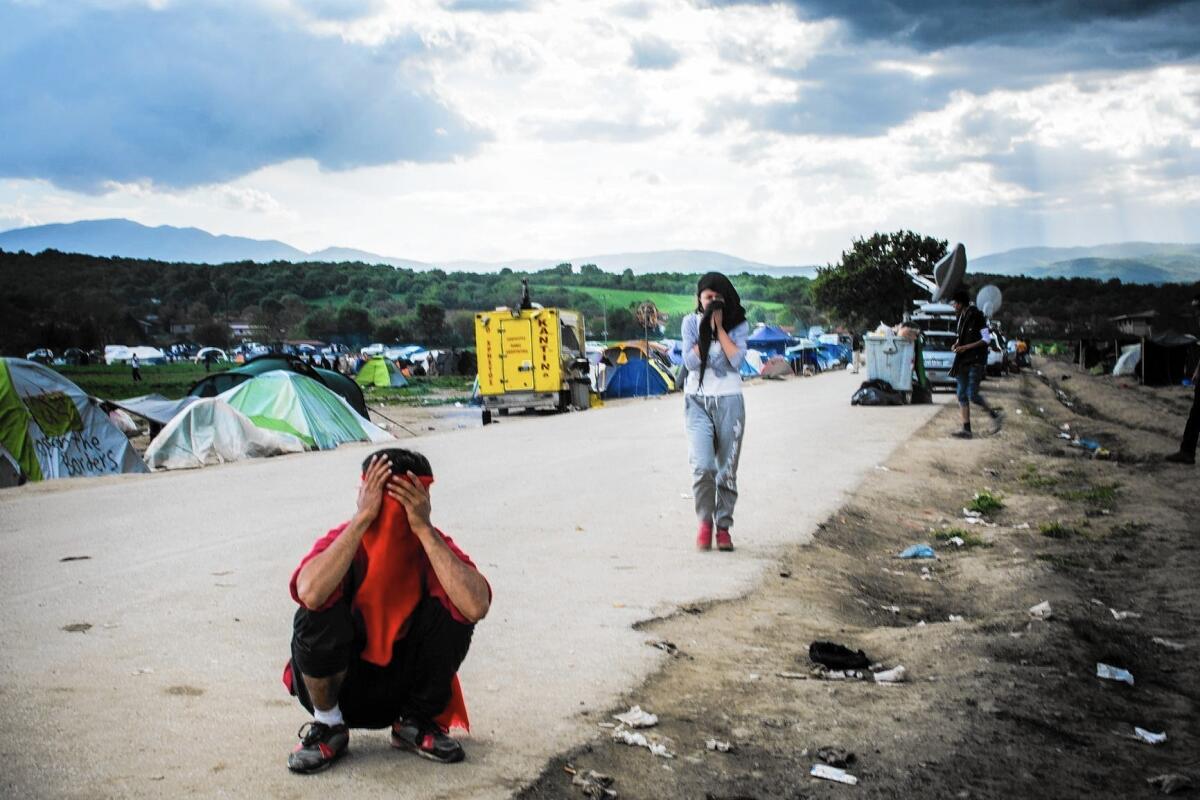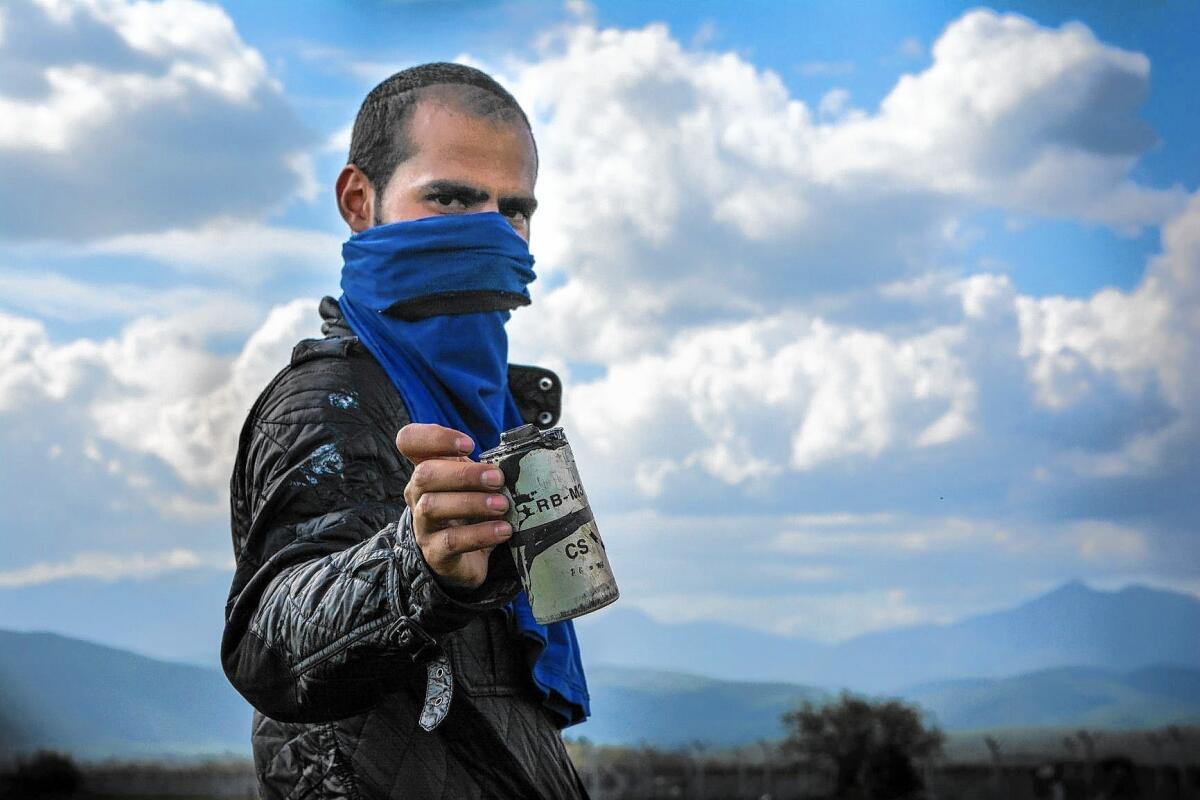On the Ground: Border skirmishes: Syrian refugees stranded in Greece collide with Macedonian troops
IDOMENI, Greece — A tear-gas canister arced through the sky above a spring-green field on the Greek-Macedonian border. “Get out of the way!” came the shout in Arabic, as the canister scattered a crowd of young men, mostly Syrians, with bandannas pulled up over their noses. The bravest rushed toward the belching gas, smothering the canister with blankets issued by the United Nations refugee agency.
Another blast, and another canister. This time a young man picked it up, searing hot, and hurled it back at the Macedonian forces on the other side of the border fence. As the canister bounced off an armored personnel carrier, the crowd cheered. A small victory.

The border patrol fired back: rubber bullets big enough to see as they cut the air. The migrants ducked and ran, then circled back, cursing, with middle fingers raised.
This is how it would go for most of the day: skirmish and standoff at the chain-link and razor-wire fence in Idomeni, where Greece meets Macedonia. More than 10,000 men, women and children have taken temporary refuge here since February, in a makeshift tent city with only the barest of services. They have made it this far from Syria, Iraq or Afghanistan on the Balkan route to Europe. Now they wait, testing the resolve of the European Union, and the whole world, it seems.
Join the conversation on Facebook>>

Initially the refugees had hoped — believed — the border would open April 10. That morning, a democratically nominated delegation of five representatives had been allowed to cross to the Macedonian side to plead their case. Mustafa Alhamoud, 32, from Syria and the youngest of the camp representatives, wanted me to understand the day had started peacefully: “We are a peaceful people who want to peacefully cross to Europe. When the Greeks tell us we can cross to talk to the Macedonians, I say only if the press can come. I want the world to see we tried to be peaceful.”
After three hours of talk, however, the border remained closed. That's when a frustrated group of about 300 men and boys stormed the fence and managed to tear through the reinforced chain link and razor wire in four places. The Macedonians moved swiftly, swinging batons, according to some reports, and using tear gas and rubber bullets to push the migrants off the fence.
About an hour after the initial assault, as grandparents, women and children retreated south, the men on the Greek side settled into a fitful tit-for-tat with the border troops. Whenever the migrants advanced, the Macedonians responded. They shot high, slapping hands when pellets hit a sign at a nearby railroad crossing and a ping rang out. Some of the migrants threw rocks. Others launched stones with homemade slingshots.
As the day wore on, the border patrol lowered its guns, leveling them at the crowds. One boy, who wasn't completely innocent — I saw him throw a gas canister back over the border fence — was knocked unconscious by a rubber bullet. As the Macedonians stepped up the gas barrage, the migrants quickly adapted. Word got out that toothpaste could keep the gas from burning sensitive skin around their eyes. They flushed away burning tears with water from a steady supply of refilled plastic bottles, passed back and forth through the crowd.
Macedonian reinforcements arrived by helicopter late in the day. They switched tactics, instead of firing at protesters they rained tear-gas canisters onto the closest line of tents. Families and aid workers scrambled to douse the fires. Greek police, who were otherwise kind and helpful, never challenged the Macedonian incursion.
It started to rain, and the fracas eased. The field began to clear. Camera crews packed up. The drama seemed to be over. But then the wind changed direction, blowing into the camp.

The Macedonians took full advantage of the shift, firing tear gas deep into Greek territory, over the Doctors Without Borders compound, over the food distribution center, over the U.N. tents, into the densest parts of the Idomeni camp. The acrid smoke was inescapable. Parents ran from the tents carrying wailing or unconscious children. Men and women slumped by the side of the roadways. Macedonia had finished the day by raising a middle finger back at the Idomeni refugees.

Europe claims to be overwhelmed by the generosity it has thus far extended to millions of migrants. The EU's citizens feel vulnerable and afraid. In a controversial deal cut in March, Greece has begun to deport some of the latest newcomers arriving on its shores. But as Europe considers its options, at least 50,000 migrants, refugees and asylum seekers remain in limbo in Greece alone.
I asked Mustafa Alhamoud if he had honestly believed the Idomeni delegation would succeed at opening the Macedonian border. He shrugged: We had to try.
I asked the young men who had faced down the troops if they understood what came after Macedonia more troops, more political resistance and between three and five more border crossings on the way to their preferred destination: Germany. They shrugged too. They were focused on the border at Idomeni. No matter how insignificant a step it might be in their journey, crossing would be cause for renewed hope.
Writer-photographer Vladimir Cvetko is on hiatus from his work as writer for the cable TV series “Power” and “Kingdom.”
Follow the Opinion section on Twitter @latimesopinion and Facebook
MORE "ON THE GROUND"
'We believe that this is just the beginning': Residents despair over Turkey's deadly conflict
A cure for the common opinion
Get thought-provoking perspectives with our weekly newsletter.
You may occasionally receive promotional content from the Los Angeles Times.



